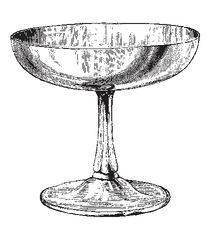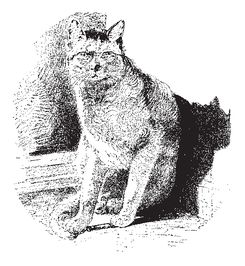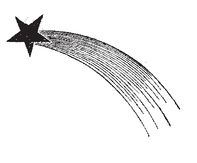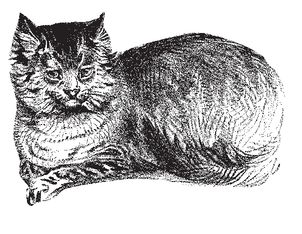Three Wise Cats (13 page)
Authors: Harold Konstantelos

Melchior stepped forward. “First, we wish to present you with some humble offerings, and then perhaps, if it does not tire you overly much, to speak with you about prophecies and other matters.”
Herod's eyes gleamed at the thought of gifts, and he had of course already glimpsed the ornate birdcage. “Bring them forth.” He popped several stuffed dates dripping with honey into his mouth.
The servant presented him with the goblet of jewels first. “A drink to toast your return to health,” Kaspar said, and Herod smiled slightly. He took the goblet with a hand that shook but still managed to pour out the gems upon a small table that stood nearby, and he sifted them through his sticky fingers.

“Truly, one could ransom a king with this many precious stones,” Herod murmured.
Then Balthazar's servant stepped toward the ailing king. He opened the carved box and presented the rings. Herod frowned. “What are these? They are neither beautiful nor amazingly wrought.”
Balthazar quickly related the story of how the rings had come to be found, and Herod's eyebrows worked themselves up into his hairline and remained there. “You found them by a dream's direction?”
“Yes, King Herod. And I know only that they must be precious in their application, for as you have said, they are but metal, stone, and wood.”
“Hmm.” Herod reached for the rings and put them on his left hand, not bothering to wash first. “Surely the metal one would belong to the finger of Jupiter and mighty rulers . . . and the one of stone would be for Saturn, having great responsibility . . . but that leaves the one of wood for the finger over which the heart rules.” As Herod forced the wooden ring upon the third finger of his left hand, the ring broke in several pieces with a loud snap.
“Ah, what fortune!” Balthazar cried, thinking swiftly. “You see, King Herod, your heart is so strong, it has burst ordinary bonds! Whatever ails you, it must not be a disorder belonging to your chest.”
Herod looked angry for a moment, but then considered what Balthazar had said. “Do you regard yourselves as prophets, then?” he asked silkily.
“In our own countries, we are revered as seers of the stars,” Kaspar told him, and he beckoned the servants carrying the doves forward. Herod peered into the cage. The birds cooed and tilted their small heads, gazing back at the man looking at them. He felt the gold bars, and his lips moved as he began to count the many jewels entwined therein.
When he reached fifty, he sighed and settled back among his pillows. “This is the most richly wrought cage I have yet beheld,” he muttered. “You may take the boy who guided you here with you when you leave, as my thanks.”
The three wise men bowed again. Then Kaspar spoke.
“It is we who must thank you for your gift to us of your slave. But, King Herod, we still wish to ask you of ancient prophecies. We have traveled to your country to seek the one they call the Messiah.”
“What need have you of my thoughts, when you yourselves study the stars?” he growled. Then he snapped his fingers. “You, boy! Bring my chief priests and scribes here.” Grudgingly, he bade them be seated and had another servant offer the wise men some of the honeyed dates.
Within moments, six or seven elderly men assembled in the room. When Herod challenged them as to whether a new Messiah had been born, they gasped and mumbled and appeared extremely distressed. Herod pressed them again.
“Your reactions tell me that there has indeed been something said of this. Tell me quickly, or you shall . . .” He remembered his guests and turned toward them. “Please allow these learned men to quarrel among themselves until they reach consensus.”
A few moments later, the youngest, though still with white hair and beard, stepped toward King Herod and bowed. “We know of some prophecies, but we think the one to which these men refer must be that of Micah. It is hundreds of years old.”
“And it tells of what?” Herod asked.
“The location of the birth of the Messiah.”
Herod's face turned gray, and his mouth sagged open.
“The location of the
birth
?” he repeated incredulously. “Of the Messiah? What Messiah?”
birth
?” he repeated incredulously. “Of the Messiah? What Messiah?”
“The Jews expect a Messiah, the King of the Jews, the King of Kings, to be born, who will return their lands to them and then rule over all the earth.”

Herod shuddered. Then he turned to the three wise men, and his eyes glittered with malice. “Are you Jews?”
“No, we are but astronomers,” Melchior said quickly. “We have been following an unusual star and thought to ask you, the most learned man in these parts, whether the ancient prophecies concerned it.”

Herod thought for several long moments, while the three men waited.
He shall surely have us put to death,
Kaspar thought. Melchior and Balthazar watched the king closely.
He shall surely have us put to death,
Kaspar thought. Melchior and Balthazar watched the king closely.
“Tell me the prophecy.” Herod turned to his priests, reaching for the honeyed dates again.
The same aged man stepped forward.
“But you, Bethlehem Ephrathah, though you are little among the thousands of Judah, yet out of you shall come forth to Me the One to be Ruler in Israel, whose goings forth have been from old, from everlasting.”
He recited from memory.
“But you, Bethlehem Ephrathah, though you are little among the thousands of Judah, yet out of you shall come forth to Me the One to be Ruler in Israel, whose goings forth have been from old, from everlasting.”
He recited from memory.
Silence in the room was broken only by the sounds of a few coals hissing.
Suddenly a coughing spell shook Herod's body, and he gasped for breath. Servants ran to him, one with a flagon of vinegar, some with goblets of water or wine, while others ran toward the doors to summon help.
Melchior leaped to his feet and ran to Herod. He struck the king between his shoulder blades, expelling a date pit from Herod's mouth.
Herod drew in a gasp of air, and then shakily gulped down a goblet of wine. “As you see, I am an ill man. I thank you for saving my life and ask only that when you find this Messiah, you return and tell me of him. Although I wish to do so, I cannot accompany you because of my precarious health.” He held out his goblet to be refilled and drank deeply again. “As king, I must know all that occurs in my country, and I would not neglect to proclaim a birth of such ancient importance. I only hope he is not a man already, with me unknowingly slighting his rulership.” He waved a hand at the slave boy and, while handing him the empty goblet, hissed, “Go with them, and return to me. And be sure you recall to me exactly where they find this pretender to the throne. If you do not remember where I may find thisâMessiahâI will cut out your tongue.”
Kaspar, Melchior, and Balthazar hurriedly made their farewells and left the room, taking the ashen-faced slave with them.
The official who had met them originally was waiting for them in the guest quarters. “And what have you discussed with King Herod?” he asked.
“We have been given a task,” Kaspar answered. “We are to find the newborn Messiah and then return to bring the news to King Herod, for he has said this is our duty. And as you see, we make haste to obey the king.”
Within the hour and while some daylight lingered, they had left not only the palace but Jerusalem as well.
Balthazar shook his head at the events of the past few hours.
Servants and slaves whisper rumors of Herod's own sons, whom he put to death to prevent their ascension to his throne. That ring must have broken from the hardness of Herod's heart.
He and the others were riding swiftly across the desert as the cold wind grew more bitter and snow began to fly.
Servants and slaves whisper rumors of Herod's own sons, whom he put to death to prevent their ascension to his throne. That ring must have broken from the hardness of Herod's heart.
He and the others were riding swiftly across the desert as the cold wind grew more bitter and snow began to fly.

“I would far rather be out here in this storm than in that overly warm palace!” he called to the other men.
They nodded in agreement, glad to be out of Herod's clutches. But the small slave boy they had been given shut his eyes and clung in genuine terror to the servant mounted in front of him, for he had never before seen a camel, much less ridden upon one.
What do we do now?
Abishag wondered. And then she knew.
We follow the star, of course
. And she slept peacefully in her basket.
Abishag wondered. And then she knew.
We follow the star, of course
. And she slept peacefully in her basket.
14
T
HE WIND GREW fierce and the snowstorm settled in as the small caravan struggled through the afternoon. Finally, Kaspar called a halt as they came to a series of small hills.
HE WIND GREW fierce and the snowstorm settled in as the small caravan struggled through the afternoon. Finally, Kaspar called a halt as they came to a series of small hills.
“I fear we are losing our way!” he shouted to make his voice heard against the howling wind.
Balthazar turned in his saddle. Cupping his hands about his mouth, he shouted in return, “Let us make camp here and wait for the storm to cease!”
Wiping ice crystals from his face, Melchior leaned over Kezia's basket. “Are you faring well, small one? We shall have a cold camp tonight, I believe, but surely this storm cannot last much longer.”
Unable to keep even a small fire going in the icy blasts, the wise men placed the cats' big basket in the middle of the camels' circle as the beasts rested. They had their servants wrap up warmly, as they did themselves, and all settled to wait out the ferocious storm, backs to the small bluffs for scant protection.
The storm lingered until after noon the next day. Drifts of snow and ice crystals had sifted over the backs of the camels and glittered upon the packs. Throughout the storm, the three men had checked on their servants and animals, not forgetting to remind Herod's slave boy to rise and stamp his feet periodically. The camels had been fed, but everyone else felt hunger along with the cold. Finally Balthazar managed to get some wisps of kindling burning and carefully added bits of charcoal to a small brazier.
Kaspar nudged him as they watched the small curl of smoke. “And what did we say not one day past about an overly heated palace?”
Balthazar chuckled. “Had we had but two of Herod's huge braziers, we would have had a feast in the midst of the blizzard.”
Scrambling out of their basket, the cats remembered to thank the camels for sharing their warmth during the bitter cold. Then they followed Ira to the small hills.
“I don't really know whether they understand us or not,” Abishag said thoughtfully. “They may not speak cat.”
Other books
The Ghost by Danielle Steel
Winter's Child by Cameron Dokey
Untouched by Accardo, Jus
R. E. Bradshaw - Rainey Nights by R. E. Bradshaw
Black Raven's Lady: Highland Lairds Trilogy by Kathleen Harrington
Postsingular by Rudy Rucker
Taking his Risk (Year of the Billionaire Part 2) by Falls, K.C.
Surrender Seremity (Salin's Salvation 1) by Astrid Cielo nodrm by Astrid Cielo
A Brother's Generous . . . Offer by Catharina Shields
Time to Live: Part Five by John Gilstrap
